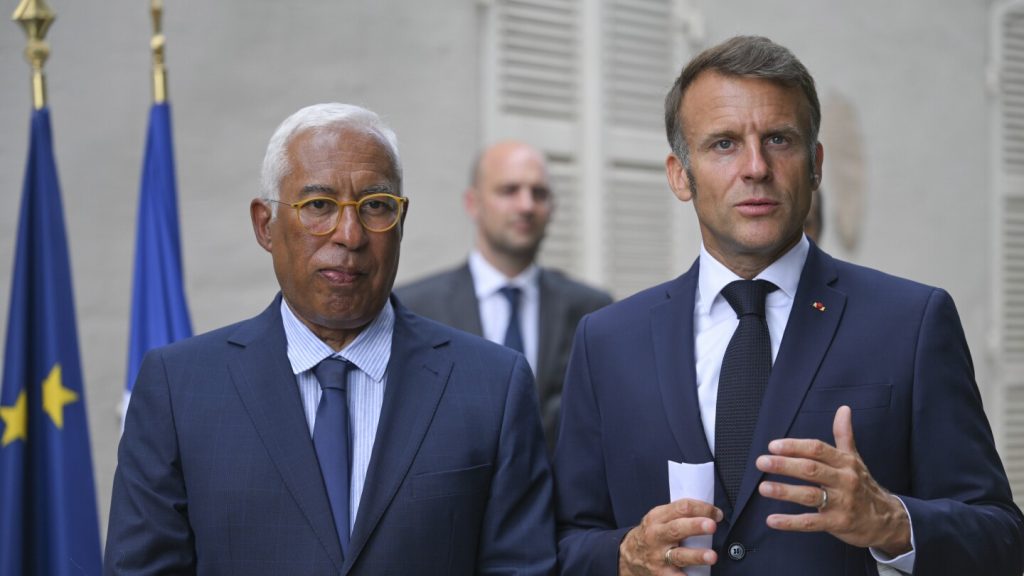BRUSSELS (AP) — The greenlight given by President Donald Trump on U.S. backup for a European-led force to police any future peace agreement in Ukraine vastly improves the likelihood it might succeed.
European leaders said Trump offered his backing during a call they held ahead of his summit with his Russian President Vladimir Putin on Friday.
The effectiveness of the operation, drawn up by the so-called coalition of the willing of around 30 countries supporting Ukraine, hinges on U.S. backup with airpower or other military equipment that European armed forces do not have, or only in short supply.
EU leaders regularly have underlined how the United States is “crucial” to the success of the security operation dubbed Multinational Force Ukraine. But the Trump administration has long refused to commit, perhaps keeping its participation on hold as leverage in talks with Russia.
After a meeting Wednesday between Trump and European leaders, European Council President Antonio Costa welcomed “the readiness of the United States to share with Europe the efforts to reinforce security conditions once we obtain a durable and just peace for Ukraine.”
French President Emmanuel Macron said Trump had insisted NATO must not be part of these security guarantees, but the U.S. leader agreed “the United States and all the (other) parties involved should take part.”
“It’s a very important clarification,” Macron said.
Trump did not publicly confirm he would allow U.S. backup, and no details of possible U.S. support were made public, but U.S. Vice President JD Vance sat in on the coalition meeting for the first time.
The Multinational Force Ukraine
More than 200 military planners have worked for months on ways to ensure a future peace should the war, now in its fourth year, finally halt. Ukraine’s armed forces also have been involved, and British personnel have led reconnaissance work inside Ukraine.
The exact size of the force has not been made public, although Britain has said it could number 10,000 to 30,000 troops. It must be enough to deter Russian forces, but also of a realistic size for nations that shrank their militaries after the Cold War and are now rearming.
The “reassurance” force’s mission “will be to strengthen Ukraine’s defenses on the land, at sea, and in the air because the Ukrainian Armed Forces are the best deterrent against future Russian aggression,” U.K. Defence Secretary John Healey told lawmakers last month.
“It will secure Ukraine’s skies by using aircraft,” Healey said, “and it will support safer seas by bolstering the Black Sea Task Force with additional specialist teams.”
Bulgaria, Romania and Turkey launched that naval force a year ago to deal with mines in Black Sea waters.
The force initially will have its headquarters in Paris before moving to London next year. A coordination headquarters in Kyiv will be involved once hostilities cease and it deploys.
The impact of US participation
European efforts to set up the force have been seen as a first test of the continent’s willingness to defend itself and its interests, given Trump administration warnings that Europe must take care of its own security and that of Ukraine in future.
Still, U.S. forces clearly provide a deterrent that the Europeans cannot muster.
Details of what the U.S. might contribute were unknown, and Trump has changed his mind in the past, so it remains to be seen whether this signal will be enough to persuade more countries within the coalition to provide troops.
Greece has publicly rejected doing so. Prime Minister Kyriakos Mitsotakis said last month that those discussions were “somewhat divisive” and distracted from the goal of ending the war as soon as possible.
Italy’s Prime Minister Giorgia Meloni has said Rome won’t contribute troops, but she previously has underlined the importance of working with the U.S. on ending the conflict and called for the participation of an American delegation in force coordination meetings.
___
AP European Security Correspondent Emma Burrows in London contributed.


